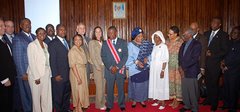I was half asleep in the front seat the other day, coming back from some exhausting tour of an educational establishment, and in the back seat were two twentysomething female graduates. They were talking about men, so I tried to focus, while keeping my eyes cunningly half closed.
One of them made the eternal feminine complaint. "All men are useless these days," she said. "Yeah," said the other. "The trouble is that they haven't risen to the challenge of feminism. They don't understand that we need them to be more masculine, and instead they have just copped out."
I am afraid that, at this point, I copped out myself, and slid into unconsciousness. But before I went under I thought, hmmm, this is interesting; and I think back to that conversation as I read that women continue their astonishing dominance of university admissions.
advertisement
document.write('
');
Look at those girls go! Women now make up 57 per cent of university entrants, and they outnumber men in every subject — including maths and engineering. This thing is huge, and it is happening at every level, and no one seems to be thinking about the consequences.
Most trainee barristers and two thirds of medical students are now women — compared with 29 per cent women in the early 1990s. If current trends continue, most doctors will be female by 2012. It is ludicrous for the Equal Opportunities Commission to keep droning on about "glass ceilings" at the top of corporate Britain, or in the judiciary, when you think how fast this transformation has been.
It is a stunning fact — the biggest social revolution of our lifetime — that far more women than men are now receiving what is in theory an elite academic education. When I was at university 20 years ago, the figures were almost exactly the other way round, with the ratio 60:40 in favour of males. Far more female graduates are coming out of our universities than male graduates — and, in 30 years' time, when these people reach the peak of their careers, the entire management structure of Britain will have been transformed and feminised.
Speaking as an ardent feminist, I expect that this will have many wonderful results: a culture that is more feng shui and emotionally literate and altogether nicer, and an economy that benefits from unleashing the phenomenal energy and talents of British women who are — if GCSEs, A-levels and university entrance results mean anything — currently giving the male sex a good old intellectual thrashing.
Obviously a neanderthal corner of my heart worries about some aspects of the coming feminisation. Will we all become even more namby-pamby, elf-n-safety-conscious, regulation-prone and generally incapable of beating the Australians at anything than we already are? Hmm? And even if the feminist revolution is good and unstoppable (and it is both), we should perhaps consider some of the downsides — and the most interesting is that greater equality between the sexes is actually leading to greater division between the classes. Here's how.
Since the emergence of our species, it has been a brutally sexist feature of romance that women on the whole — and I stress on the whole — will want to mate/procreate with men who are either on a par with themselves, or their superior, in socio-economic and intellectual attainment. A recent study shows that if a man's IQ rises by 16 points, his chances of marrying increase by 35 per cent; if a woman's IQ rises by 16 points, her chances of getting hitched decline by the same amount.
Now look at those university entrance figures again, feed in that basic human prejudice, and some recent social phenomena become intelligible. If you have a sudden surge in the number of highly educated women — more women than men — then it is not surprising that you have a fair few Bridget Jones-type characters who are having a tough job finding Mr Darcy. It is a gloomy truth that 40 per cent of female graduates born in 1970 are likely to enter their forties childless.
As a result of the same instinct — female desire to procreate with their intellectual equals — the huge increase in female university enrolments is leading to a rise in what the sociologists call assortative mating. A snappier word for it is homogamy. The more middle-class graduates we create, the more they seem to settle down with other middle-class graduates, very largely because of the feminine romantic imperative already described. The result is that the expansion of university education has actually been accompanied by a decline in social mobility, and that is because these massive enrolments have been overwhelmingly middle-class.
It is one of the sad failures of this Government that relatively few bright children from poor backgrounds have been encouraged to go to university, partly because of weaknesses in primary and secondary education, partly because of the withdrawal of the ladder of opportunity provided by academic selection. Once they have failed to go to university, the boom in the number of middle-class female students only intensifies their disadvantages.
Let's put it bluntly: nice female middle-class graduates are either becoming permanent Bridget Joneses, or marrying nice male graduates, and they seem on the whole to be turning up their nice graduate noses at male non-graduates. And when the nice middle-class graduate couples get together, they have the double income to buy the houses and push the prices up — and make life even tougher for the non-graduates.
The result is that we have widening social divisions, and two particularly miserable groups: the female graduates who think men are all useless because they can't find a graduate husband, and the male non-graduates who feel increasingly trampled on by the feminist revolution, and resentful of all these hoity-toity female graduates who won't give them the time of day.
What is the answer, my friends? I don't know. We could try fiscal incentives for heterogamy. We could have plotlines in soap operas, in which double first girls regularly marry illiterate brickies.
But the only long-term solution for the "uselessness" of young men, as complained of by my twentysomething colleagues, is to get serious with the education of males in primary schools. And if the Equal Opportunities Commission wants to say something sensible for a change, it should start campaigning for more male teachers.










